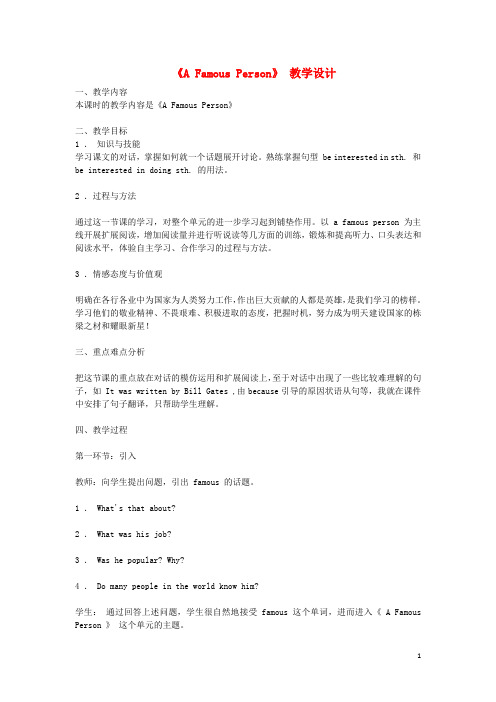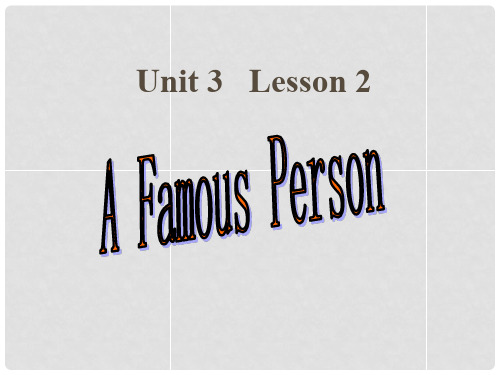七年级英语下册 unit 3 lesson 2 A Famous Person课件2 上海新世纪版(1)
Unit3第2课Section A 2e-Grammar focus 3c教学课件七年级下册人教版)

You,too.
Presentation 2e Read again and finish the chart.
Name
How?
How long? (minutes) How far? (kilometers)
No, he doesn’t.
Use these words to make questions, then ask and answer with Practice 3b your partner.
school
get to
how
you
do
How do you go to school?
Use these words to make questions, then ask and answer with Practice 3b your partner.
-YI etsa.kIer/irdide eitato/tshceh+o交ol通ev工er具y。day. How do you get to school?
-How does he/she go/get to ...?
-HeI/Suhsueatlalyketsa/kreidtehse ab/uths.e+交通工具。
school
to
Do your friends ride their bikes to school?
Part four
Production
.......
Production 3c Ask your classmates questions and write their names in the chart. The first student to fill in all the blanks wins!
七年级下册英语topic 3知识点

七年级下册英语topic 3知识点In the 7th grade English curriculum, Topic 3 covers various knowledge points that students need to master. In this article, we will discuss these knowledge points in detail to help students better understand and excel in their English studies.VocabularyVocabulary is an essential part of learning any language. In Topic 3, students will learn the following words and phrases:- Environment: air, climate, pollution, energy, recycle, etc.- Entertainment: concert, movie, theater, sports, game, etc.- Travel: airport, station, ticket, passport, luggage, etc.- Health: medicine, illness, doctor, nurse, hospital, etc.It is important for students to not only memorize these words but also practice using them in context.GrammarGrammar is the backbone of any language. In Topic 3, students will focus on the following grammar points:- Simple present tense: Students will learn how to use the simple present tense to talk about facts, habits, and routines.- Present continuous tense: Students will learn how to use the present continuous tense to talk about actions happening at the moment or in the near future.- Adverbs of frequency: Students will learn how to use adverbs of frequency (always, sometimes, rarely, never, etc.) to talk about how often they do something.- Comparative and superlative adjectives: Students will learn how to compare two or more things using comparative and superlative adjectives.Reading and WritingReading and writing are crucial skills for language learners. In Topic 3, students will practice reading and writing by:- Reading short passages about different topics and answering comprehension questions.- Writing paragraphs and short essays about topics such as their favorite hobbies, their dream vacation, or their opinion on a current event.Listening and SpeakingListening and speaking are also important skills for language learners. In Topic 3, students will practice these skills by:- Listening to short dialogues and answering questions about them.- Speaking in class by participating in discussions, giving presentations, and practicing pronunciation.CultureUnderstanding the culture and customs of English-speaking countries is also an important aspect of learning the language. In Topic 3, students will learn about:- Traditional holidays and celebrations such as Christmas, Halloween, and Thanksgiving.- Famous landmarks and tourist attractions such as the Statue of Liberty, the Eiffel Tower, and the Great Wall of China.- Popular sports and pastimes such as soccer, basketball, and video games.ConclusionTopic 3 covers a wide range of knowledge points that are essential for 7th grade English students to master. By focusing on vocabulary, grammar, reading, writing, listening, speaking, and culture, students can improve their overall English proficiency and achieve academic success.。
七年级下册英语unit3单词知识点

七年级下册英语unit3单词知识点【Introduction】Unit 3 is a very important unit for junior high school students who are learning English. In this unit, students will learn a lot of new words that will help them to expand their vocabulary and communicate more effectively in English. In this article, we will be discussing the key vocabulary points that students need to know in order to succeed in this unit.【Vocabulary】1. Ability: the power or skill to do something2. Accomplish: to successfully complete a task or a goal3. Attitude: a settled way of thinking or feeling about someone or something4. Behavior: the way in which one acts or conducts oneself, especially towards others5. Challenge: a task or mission that is difficult and requires effort to complete6. Confident: feeling or showing assurance in oneself, one's abilities, and one's qualities7. Encourage: to give support, confidence, or hope to someone8. Expect: to regard something as likely to happen9. Failure: an instance or situation where one does not succeed10. Goal: something that one aims for or achieves11. Influence: the capacity to have an effect on the character, development, or behavior of someone or something12. Mistake: an action, decision, or judgment that is misguided or wrong13. Negative: expressing or implying the opposite of something14. Positive: expressing or implying the presence or existence of something15. Respect: a feeling of deep admiration for someone or something elicited by their abilities, qualities, or achievements16. Responsibility: the state or fact of having a duty to deal with something or someone17. Talent: a natural aptitude or skill18. Trust: firm belief in the reliability, truth, ability, or strength of someone or something【Conclusion】In conclusion, these are the key vocabulary points that will help students to understand and communicate effectively in unit 3 of their English textbook. By learning these words and their meanings, studentswill be better equipped to handle the challenges of this unit and to succeed in their English studies. Keep practicing and studying, and don't forget to use your new vocabulary words in your everyday life!。
七年级英语下册 unit 3 lesson 2 A Famous Person教学设计1 上海新世纪版

《A Famous Person》教学设计一、教学内容本课时的教学内容是《A Famous Person》二、教学目标1 .知识与技能学习课文的对话,掌握如何就一个话题展开讨论。
熟练掌握句型 be interested in sth. 和be interested in doing sth. 的用法。
2 .过程与方法通过这一节课的学习,对整个单元的进一步学习起到铺垫作用。
以 a famous person 为主线开展扩展阅读,增加阅读量并进行听说读等几方面的训练,锻炼和提高听力、口头表达和阅读水平,体验自主学习、合作学习的过程与方法。
3 .情感态度与价值观明确在各行各业中为国家为人类努力工作,作出巨大贡献的人都是英雄,是我们学习的榜样。
学习他们的敬业精神、不畏艰难、积极进取的态度,把握时机,努力成为明天建设国家的栋梁之材和耀眼新星!三、重点难点分析把这节课的重点放在对话的模仿运用和扩展阅读上,至于对话中出现了一些比较难理解的句子,如 It was written by Bill Gates ,由because引导的原因状语从句等,我就在课件中安排了句子翻译,只帮助学生理解。
四、教学过程第一环节:引入教师:向学生提出问题,引出 famous 的话题。
1 . What's that about?2 . What was his job?3 . Was he popular? Why?4 . Do many people in the world know him?学生:通过回答上述问题,学生很自然地接受 famous 这个单词,进而进入《 A Famous Person 》这个单元的主题。
第二环节:新授1 .学习本课的新单词2 .先播放对话的视频教师:提出问题 Whose book do they talk about ?学生:带着问题听和看,边看边思考。
设计意图:视频的对话语速较快,问题不能太多。
七年级英语下册 unit 3 lesson 2 A Famous Person课件

Occupation:_c_om__p_u_t_e_r scientist Workplace:__M_i_c_ro_s_o_f_t _ Character: __k_in_d____, generous(慷慨的) Company
Experience: 1968 began _p_ro_g_r_a_m__m_in_g__ computers
Because和 so不能同时出现在一个句子中
Describe the following pictures after the model. Use the word cues.
Model:
This is Lei Feng. He was a soldier. Although he wasn’t rich, he often donated his money to the Poor. He was always ready to help others.
Can you describe it? company, be set up in 1975, sell software
1. What’s the young man’s dream? 2. He wants to become a computer
scientist, doesn’t he? 3. What does his teacher say to him?
Because Bill Gates was interested in computer science, he set up a computer company.
Bill Gates was interested in computer science, so he set up a computer company.
七年级英语下册 unit 3 lesson 2 A famous person教学设计2 上海新世纪版 (1)

Unit 3 lesson 2(A famous person)指导思想与理论依据将自己在本节课教学中的亮点设计所依据的指导思想或者核心教育教学理论简述即可,指导思想和依据的教育理论应该在后面的教学过程中明确体现出来。
本部分内容必须和实际的教学内容紧密联系,避免出现照搬课标中整个模块的教学指导思想等情况在本节课的教学设计中,首先根据教材内容,明确了本课的教学目标,理清教学重点、难点,然后选择适当的方式,考虑学生的心理特征,通过创设情境,激发学生的兴趣和求知欲,再提出学习任务和要求,最后利用教学资源和学习资料,让学生进行自主探索和合作交流,充分体现学生的主体作用,从而培养他们的阅读能力提升学生的阅读水平。
一. 教材分析课标中对本节内容的要求;本节内容的知识体系;本节内容在教材中的地位,前后教材内容的逻辑关系。
本节核心内容的功能和价值(为什么学本节内容),不仅要思考其他内容对本节内容学习的帮助,本节内容的学习对学科体系的建立、其他学科内容学习的帮助;还应该思考通过本节内容的学习,对学生学科能力甚至综合素质的帮助,以及思维方式的变化影响等二. 学情分析(可以从以下几个方面进行阐述,但不需要格式化,不必面面俱到)教师主观分析、师生访谈、学生作业或试题分析反馈、问卷调查等是比较有效的学习者分析的测量手段。
学生认知发展分析:主要分析学生现在的认知基础(包括知识基础和能力基础),要形成本节内容应该要走的认知发展线,即从学生现有的认知基础,经过哪几个环节,最终形成本节课要达到的知识。
三. 教学目标(教学目标的确定应注意按照新课程的三维目标体系进行分析)1.知识目标Students should be able to read the text and answer questions correctly,and also grasp the new words and useful expressions.2.技能目标Students should say something about Bill Gates in their own words.Can describe a person they like.3.情感目标Help the students set up their own aims about life.Try to study hard and work hard.四. 教学重点和难点教学重点1. Background of Bill Gates.2. New words and useful expressions: learn from sb. be born, grow up, in the future,start to do sth. at that time, lots of.教学难点1. 原因状语从句和让步状语从句Bill Gates is great because he has made computers easier for people to use.2. 指导学生对动画作品进行分析、评价和对已有知识进行整合五. 教学流程示意(按课时设计教学流程,教学流程应能清晰准确的表述本节课的教学环节,以及教学环节的核心活动内容。
牛津译林版英语七年级下册Unit3 Reading教材知识详解

Unit3 Reading教材知识详解1. The air is fresh here.这里的空气很新鲜。
句中的fresh是形容词,作表语,意思是“新鲜的”。
形容词fresh在句子中除了作表语之外,还可以作定语和宾语补足语等。
如:We can get fresh air in Sunshine Town.在阳光镇我们可以呼吸新鲜空气。
2. Beijing duck is very famous.北京烤鸭很出名。
famous在句中作表语,意思是“著名的、出名的”。
该词常与介词for 连用,构成词组be famous for 以……著称。
如:The area is famous for its green tea.这个地区因绿茶而闻名。
3. It takes only 40 minutes by underground.乘地铁只需花40分钟。
句型it takes (somebody) some time to do something表示“(某人)花费时间去做某事”。
如:It usually takes me two hours to do my homework.我通常要花两个小时做家庭作业。
4. If you do not like Chinese food, there are some of Western restaurants too.如果你不喜欢中国食品的话,那儿也有一些西方餐馆。
该句是if引导的条件状语从句,if是连词,意思是“如果,假如”。
If引导的条件状语从句,如果主句是一般将来时,则从句应用一般现在时表示将要发生的动作。
句中Western是形容词,作定语,修饰名词restaurants,意思是“西方的”。
该词是由名词west加词尾构成的。
类似的有:east—eastern东方的;north—northern北方的;south—southern南方的。
如:If I have time, I’ll go for a walk.如果我有时间,我就去散步。
新世纪课标版七年级英语下册《Lesson2AFamousPerson》教案及教学反思

新世纪课标版七年级英语下册《Lesson2AFamousPerson》教案及教学反思教学背景本教案面向新世纪课标版七年级英语下册《Lesson2AFamousPerson》的教学。
本节课的主要内容是学习并掌握一些有关名人的词汇和句型,以及对名人的简单介绍与评价。
本课程旨在培养学生的听、说、读、写综合能力。
教学目标1.学生能熟悉并掌握一些有关名人的词汇和句型;2.学生能够用英语简单介绍和评价名人;3.学生能够运用所学词汇和句型进行口头和书面表达。
教学环节1.Pre-reading before classroom activities (课前预热):通过一些简单有趣的问题激发学生的学习兴趣,培养学生的阅读主动性。
2.While-reading during classroom activities (课堂教学):以听、说、读、写综合训练为核心,通过互动、操练、游戏等形式,让学生在体验中学习。
3.Post-reading after classroom activities (课后拓展):通过课后作业、小组讨论、个人分享等方式巩固所学知识,拓展学生的思维。
教学重点学生能熟悉并掌握一些有关名人的词汇和句型。
教学难点学生能够用英语简单介绍和评价名人。
教学准备1.PPT和教学课件;2.上课用的录音设备;3.学生参考资料和学习笔记。
教学流程Step 1:Pre-reading(课前预热)1.教师以问题的形式引出课题:What do you think of famous people? 为什么我们要学习名人?2.让学生以小组形式讨论问题,教师帮助学生梳理讨论结果。
Step 2:While-reading(课堂教学)1.向学生介绍本节课的主要内容:本节课将学习一些有关名人的词汇和句型,同时学习如何用英语简单介绍和评价名人。
2.向学生展示有关名人的图片,并鼓励学生用英语表述。
3.引导学生阅读有关名人的短文,并通过问题引导学生思考、探究。
- 1、下载文档前请自行甄别文档内容的完整性,平台不提供额外的编辑、内容补充、找答案等附加服务。
- 2、"仅部分预览"的文档,不可在线预览部分如存在完整性等问题,可反馈申请退款(可完整预览的文档不适用该条件!)。
- 3、如文档侵犯您的权益,请联系客服反馈,我们会尽快为您处理(人工客服工作时间:9:00-18:30)。
For rLeabharlann ferenceScientists have worked hard. They have invented new machines and discovered new things to help people. For example, now we have computers, telephones, planes, cars and so on. All these inventions have made our lives more comfortable and convenient. They never lose their heart when they meet with difficulties in their work. So scientists have done all. This for people, not for money only. This is the scientists’ spirit .
4. Although the Curies needed to build a lab,
they didn’t take this chance for money. (T )
5. The Curies did not give the Americans any
information about radium. ( F )
Assignment:
1.Write at least six sentences about the topic:
What have we learned from the scientists?
again against
1. Please don’t cross the road when the red light is on. It’s _a__g_a_in__st traffic rules.
2. Sorry, I didn’t follow you. Would you please say it __a_g_a_i_n____?
DISCUSS: WHAT’S THE SCIENTISTS’ SPIRIT?
USE THE QUESTIONS CUES BELOW
1. What are the inventions around us?
2.Why have scientists invented new machines and discovered new things?
6. Marie Curie was the first woman to win
theNobel Prize.( T )
F
READING SKILL--SKIMMING
1. Why did some Americans write to them? They asked for information about radium. 2. Will they be rich if they take out a patent? Yes, they will. 3. Did Marie agree with his husband? No,she didn’t. 4. Why didn’t they do that? Because they thought that would be against the spirit of science. 5. What is radium used to do? It is used to help the sick.
Englancdh. oice
chance
TRUE OR FALSE
1. The Curies discovered radium.( T )
2. The Americans wrote to Pierre because they
wanted to buy some radium. ( F )
3. The Curies decided to take out a patent. (F )
3.Have these inventions made our lives more convenient and comfortable? Give examples.
4.What do they do when they meet with difficulties in their work?
2. Would you please wait _______________?
I’ll come at once.
3.
Allethaornu_gs_hp_i_Mr_itr_._oH_f_as_wc_i_ke_inn_cg_e_cfaronm’t
walk, him.
we
should
4. Ifcyaonu_tai_nk_ve_e_on_u_t _ts_oa_mp__ae_tte_h_nin_t_g_n. ew, you
UNIT3 LESSON 2
A FAMOUS PERSON
for a little while take out a patent discover spirit of science
1. Columbus(哥伦布)di_s_c_o_v_e__re_d___ America in
1492.
for a little while
choose choice chance
1. A: Which T-shirt will you ________, the blue one or
the red one?
choose
B: I like the red one. So the red one is my__________.
2. Tom has got a __________to go on a study trip to
